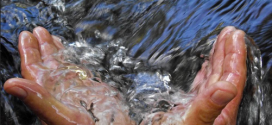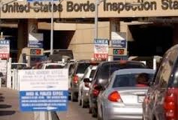 Driving down Benito Juarez, the main street in Rosarito, can be a Spanish lesson. At first the barrage of Spanish storefronts was daunting, but over time I’ve learned what most mean.
Driving down Benito Juarez, the main street in Rosarito, can be a Spanish lesson. At first the barrage of Spanish storefronts was daunting, but over time I’ve learned what most mean.
Flores, copia, licores, dentista, and optica are easy. Also farmacia. A favorite is fotografia. I can easily understand these. It makes sense to spell “photo” with an “f” rather than “ph”. Fred, a friend, jokingly signs, Phred.
We know “cerrado” on a door means closed and “abierto” means open. When you come to a door, don’t push when it says “jale” or pull when the sign says “empujar.” I associate the “l” in jale with pull and the “pu” in empujar with push.
Some common storefront signs give one pause: carniceria (meat), dulceria (candy), taqueria (taco), and tortilleria (tortilla). However, knowing that “eria” at the end of a word means “store” opens up a wide variety of words. For example, a floreria is florist.
 But, not all are as simple. A few memory techniques will help: bread is baked in a pan, bread is pan. A panaderia is a bakery, a place where pan is baked. An easy way to remember that joyeria is a jewelry story is to associate it with the “joy” buying jewelry will bring to one’s wife. Remember that gritty old soap, Lava? A lavanderia is a laundromat. Any business with “lava” has to do with cleaning. Simple. A ferreteria is a hardware store (Latin root, “ferre” means iron). And a tapiceria (tapestry) recovers furniture. A peluqueria is a men’s barbershop; while estetica is a woman’s hair salon.
But, not all are as simple. A few memory techniques will help: bread is baked in a pan, bread is pan. A panaderia is a bakery, a place where pan is baked. An easy way to remember that joyeria is a jewelry story is to associate it with the “joy” buying jewelry will bring to one’s wife. Remember that gritty old soap, Lava? A lavanderia is a laundromat. Any business with “lava” has to do with cleaning. Simple. A ferreteria is a hardware store (Latin root, “ferre” means iron). And a tapiceria (tapestry) recovers furniture. A peluqueria is a men’s barbershop; while estetica is a woman’s hair salon.
Need shoes? Think tap shoes, rhymes with zap. A zapateria is a shoe store. Knowing that cerrado means “closed” helps us understand that cerrejeria is a locksmith, while the word “llaves” means makes copies of keys. A papeleria is a paper or gift-wrapping store. Usually they have a stack of brightly wrapped packages outside the door. A regalos is a small gift store, and llanteria a tire repair shop. Ice cream is helado, but look for neveria, ice cream shop. Need a window repaired? Look for a glass shop, a vidrieria. A vet? Veterinaria.
Mercardo means market. Sometimes a market has a painted sign: abarrotes (groceries) or alimentos (food) or frutas y verduras–fruit and vegetables. Knowing “mar” in mariscos means sea helps identify fish taco stands or tacos pescado, simply fish tacos.
A second hand store is a segunda, meaning second. And schools are sometimes secundaria schools, or secondary. Colegio resembles college, but in Spanish it simply means school.
And easiest of all is the universal pizza, a pizzeria. That seems to need no translation. Remember “eria” at the end means “store” — an assist on the road to learning Spanish.
 Baja Review A community newspaper serving Ensenada, Valle de Guadalupe, and Rosarito in Northern Baja California
Baja Review A community newspaper serving Ensenada, Valle de Guadalupe, and Rosarito in Northern Baja California




